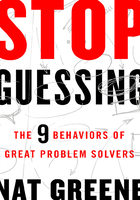
GOOD PROBLEM-SOLVERS ARE PROBLEM-SMELLERS
People have been solving problems since the early days of human civilization. Let’s use an example everyone is familiar with: going to the doctor. In the days of Hippocrates in ancient Greece, doctors had little technology at hand to diagnose illnesses. Back then before lab testing, doctors would poke and prod, bend an arm, listen to your stomach or chest. They’d even smell wounds for gangrene and infection, smell your breath or your stool to learn more about gastrointestinal problems. They were very rigorously studying the problem and the patterns of failure.
In modern times, good doctors study the problem before coming up with potential diagnoses or even running more complex or expensive tests. They’ll also poke and prod you. They ask you to move, bend, twist, cough, and report how you feel. They listen with a stethoscope, and take your temperature, blood pressure, and pulse. They want to know what you ate or what your physical activity has been. If the stakes are high or the cause is hard to pin down, they will schedule an X-ray, lab work, or an MRI, but only after first using simpler methods.
Doctors will also ask you to keep a log of what you eat or your physical activity if you have a chronic or recurring problem that they can’t diagnose by looking at your body. You’ll write what you ate, what you did, and how you felt, with an eye to the specific problem. Great problem-solvers will make sure their data, too, is robust and problem-specific.
Psychologists and therapists do the same thing. They have a battery of questions. They dig into your past. Good ones may spend hours dissecting your mind before attempting to diagnose. It’s a long way from your friend telling you that you need a better attitude, after listening to you for a few minutes and jumping to a solution.
You can do this, too. A friend of mine has asked me whether he was drinking too much and if he has a problem with alcohol. Now I don’t think I am particularly qualified to make this judgment, but I can help him look at what is actually going on. Most people have simply told him either, “don’t worry about it,” or “yes, you should drink less.” How they have the information to draw that conclusion beats me. I have had him smell the problem by keeping a diary of how much he drinks and when, as well as noting his emotional state when doing so. Where it will lead I am not sure, but getting actual data will allow for progress on what could be a hard problem with serious consequences.
This approach, smelling the problem, can give you lots of insight about the nature of the problem you are experiencing. With simpler problems, establishing a strong pattern of failure can give you the solution on its own.